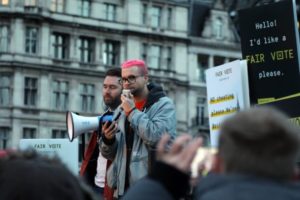2018 Whistleblower of the Year Candidate – Cambridge Analytica Whistleblower Christopher Wylie

In 2013, American author Dave Eggers published The Circle, a novel chronicling the adventures of a technology worker at a powerful Internet company. The company collects heaps of information about its subscribers and uses it in all aspects of their lives: it finds missing persons within minutes, monitors individual medical conditions, and even tries to use data to require people to vote on Election Day. The company’s political power grows, influencing every level of government at dizzying speed. Dismissed by Wired as a depiction of “what the Internet looks like if you don’t understand it,” The Circle similarly drew shrugs from Silicon Valley insiders. Eggers’s post-privacy dystopia was the stuff of fiction.
In 2013 Christopher Wylie was a 24-year-old Canadian tech whiz with an idea. A PhD student in predictive data science with a background in politics, he had been working toward forecasting fashion trends. But he had other, bigger ambitions. He had come up with a plan to harvest data from Facebook profiles en masse, use this information to build detailed psychological and personal profiles, and target users with political advertisements based on their individual psychological makeups. This was military-style “information operations”—the kind that U.S. intelligence agencies use against ISIS online, but for the ballot box.
Wylie pitched this idea to an investor and his close affiliates, who founded a data analytics and political consulting firm to carry out the plan. The investor was billionaire and Republican donor Robert Mercer. His close partner, and the firm’s co-founder who was eager to test the idea out on the ground, was Steve Bannon. Thus was born Cambridge Analytica, or what would become, in Wylie’s own words, “Bannon’s psychological warfare tool.” Wylie left the company in 2014, but the wheels had been set in motion.
By now, the extent and impact of Cambridge Analytica’s data mining are well known and the subject of multiple official investigations—from the Brexit campaign’s success in the United Kingdom to Donald Trump’s election in the United States in 2016, to Russia’s likely involvement in both. Facebook’s failure to abide by its own policies and protect at least 85 million unsuspecting users’ data, as well its callous response when it learned of Cambridge Analytica’s actions, are still under scrutiny by multiple governmental bodies.
All of us would have remained in the dark had Wylie not done something increasingly rare: he admitted his mistake. The now-29-year old, guilt-ridden and dismayed by his former colleagues’ quick rise to power within the U.S. government, went on record, stating he needed to undo the harm he had helped create. In March of 2018, Christopher Wylie came clean and blew the whistle.
Wylie’s detailed revelations set off a chain reaction. Cambridge Analytica has since shut down. The number of whistleblower reports about privacy and data breaches have tripled since March. Facebook continues to face disturbing allegations. This past December, a New York Times investigation revealed that Facebook allowed certain third-party companies access to data for years, despite assurances to the contrary.
Whistleblowing takes guts, often pitting individuals against large, powerful institutions. The potential backlash is particularly scary when these institutions are some the most influential corporations and government entities in the world. Wylie’s bravery has come with its consequences. Since he came forward, Wylie has been intermittently suspended from the social media platforms he has spoken out against, stalked, and even pushed into traffic.
Yet Wylie continues to speak out. In November 2018, he rang the alarm about potential interference in the U.S. midterm elections. He has testified before Congress on the need for greater security in digital spaces. He calls for data scientists and engineers to have a professional code of conduct and consider the ethical implications of everything they’re doing. He urges the creation of “common ground rules on the Internet” and warns that without basic regulations, “the infrastructure of our democracy is just open season.”
The Circle may not have predicted our exact political future. But the dystopian novel was prophetic in one crucial way: the increasingly important—if invisible—role that data plays in our lives. As Eggers’s story unfolds and the notion of privacy all but eclipses, the company’s employees insist that they are making the world a better place by increasing access to data. In their blind optimism, they are eerily reminiscent of current Silicon Valley executives.
Wylie stands out in his regret and blunt realism. As he puts it, “we are touching people’s lives so intimately that we should have rules to make sure we at least give due consideration to the impact of the things that we build. Otherwise we are playing with fire, and people get burned.”
For his bravery in seeking redemption, his visionary leadership in a still-unregulated field, and his continued efforts to protect us from the invisible attacks that can rattle our world, we nominate Christopher Wylie for Whistleblower of the Year.
Read about all of our Whistleblower of the Year Candidates:
- Dr. Christine Blasey Ford
- Child detention whistleblowers Dr. Pamela McPherson and Dr. Scott Allen
- The Center for Investigative Reporting and Reveal
- Church abuse whistleblower Siobhan O’Connor
Vote here for the Whistleblower of the Year
Tagged in: Cybersecurity and Data Breaches, Whistleblower of the Year,